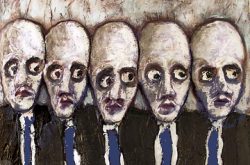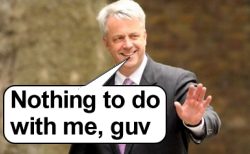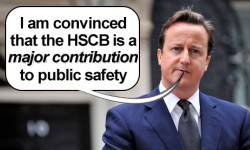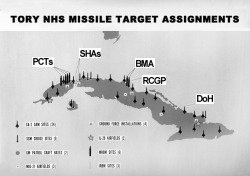 Attila the Humph attempted to interview Mr Lansley on the Today Programme earlier this week. Attila was in Gatling mode, achieving as usual more noise than hits. Lansley, on the other hand, was operating in lounge lizard mode, and the lizard just kept on talking. He also slithered a lot, but Atilla’s attacks bounced off him like dried peas off a plate glass window. The problem was that Atilla, despite having been tipped the big question by his previous interviewee, the King’s Fund’s John Appleby, was stuck in semi-automatic mode, and stayed stuck, like the proverbial to a blanket, while the lizard sped off, like the proverbial from a shovel.
Attila the Humph attempted to interview Mr Lansley on the Today Programme earlier this week. Attila was in Gatling mode, achieving as usual more noise than hits. Lansley, on the other hand, was operating in lounge lizard mode, and the lizard just kept on talking. He also slithered a lot, but Atilla’s attacks bounced off him like dried peas off a plate glass window. The problem was that Atilla, despite having been tipped the big question by his previous interviewee, the King’s Fund’s John Appleby, was stuck in semi-automatic mode, and stayed stuck, like the proverbial to a blanket, while the lizard sped off, like the proverbial from a shovel.
Category: Privatisation
The Impotence of Baffled Malice
 One of the baffling aspects of the Tories’ plan to privatise the NHS is the persistent, mis-representation of facts that has been such a feature of their campaign. The opening case for the reforms – that UK health outcomes are amongst the poorest in Europe – rested on a bed of bent numbers, promptly shown to be misleading. More recently, we have had Mr Cameron saying the ‘the whole health profession’ – the whole health profession? – last time Dr No checked there were several – ‘is on board’, despite clear evidence that the professions, whole or otherwise, had jumped ship some time ago. In April, an overwhelming 99% of RCN Congress nurses voted no confidence in Lansley’s management of the reforms. In March, a special BMA meeting noted widespread concern about the reforms, and called for the Bill to be withdrawn. More recently, an RCGP survey of 500 GPs conducted after the ‘listening exercise’ found only a maverick 4% strongly backed the reforms. Only last week, the BMA wrote to all MPs, warning that the Government’s health reforms presented an ‘unacceptably high risk to the NHS, threatening its ability to operate effectively and equitably, now and in the future’.
One of the baffling aspects of the Tories’ plan to privatise the NHS is the persistent, mis-representation of facts that has been such a feature of their campaign. The opening case for the reforms – that UK health outcomes are amongst the poorest in Europe – rested on a bed of bent numbers, promptly shown to be misleading. More recently, we have had Mr Cameron saying the ‘the whole health profession’ – the whole health profession? – last time Dr No checked there were several – ‘is on board’, despite clear evidence that the professions, whole or otherwise, had jumped ship some time ago. In April, an overwhelming 99% of RCN Congress nurses voted no confidence in Lansley’s management of the reforms. In March, a special BMA meeting noted widespread concern about the reforms, and called for the Bill to be withdrawn. More recently, an RCGP survey of 500 GPs conducted after the ‘listening exercise’ found only a maverick 4% strongly backed the reforms. Only last week, the BMA wrote to all MPs, warning that the Government’s health reforms presented an ‘unacceptably high risk to the NHS, threatening its ability to operate effectively and equitably, now and in the future’.
The Prongs of Privatisation
 In the ocean of amendments and opinions swilling round and threatening to drown sensible debate about the Tories’ Health and Social Care Bill, and its likely impact on the national health service, there is nonetheless a constant tide that ebbs and flows: the question of privatisation. Critics of the Bill – including Dr No – claim the Bill will, not so much by a big bang, as by the back door, bring about wholesale privatisation of our once national health service. Those for the Bill have been equally vehement that nothing could be further from the truth. Indeed, the Department of Health in its recent tabloid style ‘Myth Buster’ release – BIFF! SoS won’t wash his hands of the NHS! ZAP! Private patients won’t jump the NHS queue! – dismissed the privatisation claim as CRUMP! ‘ludicrous scaremongering!’. For the better understanding of any thickos who still haven’t got the point, the Department adds: ‘We have made it crystal clear, time and again, that we will never, ever, privatise the NHS’.
In the ocean of amendments and opinions swilling round and threatening to drown sensible debate about the Tories’ Health and Social Care Bill, and its likely impact on the national health service, there is nonetheless a constant tide that ebbs and flows: the question of privatisation. Critics of the Bill – including Dr No – claim the Bill will, not so much by a big bang, as by the back door, bring about wholesale privatisation of our once national health service. Those for the Bill have been equally vehement that nothing could be further from the truth. Indeed, the Department of Health in its recent tabloid style ‘Myth Buster’ release – BIFF! SoS won’t wash his hands of the NHS! ZAP! Private patients won’t jump the NHS queue! – dismissed the privatisation claim as CRUMP! ‘ludicrous scaremongering!’. For the better understanding of any thickos who still haven’t got the point, the Department adds: ‘We have made it crystal clear, time and again, that we will never, ever, privatise the NHS’.
Bad Move
 The Internet Association for Tree Hugging, Badger Loving, NHS Saving, Petition Signing and Other Worthy Causes Too Numerous To Mention, more generally known as 38 Degrees, has, at great expense, assisted a clutch of learned friends with their mortgage payments. In return, the learned friends have produced an opinion.
The Internet Association for Tree Hugging, Badger Loving, NHS Saving, Petition Signing and Other Worthy Causes Too Numerous To Mention, more generally known as 38 Degrees, has, at great expense, assisted a clutch of learned friends with their mortgage payments. In return, the learned friends have produced an opinion.
A few months back, Dr Death opened his coffin, exhaled a similar set of legal opinions, and retired, the silk-lined lid closing silently behind him. He has since remained as silent as a stiff on the matter.
In both cases, Dr No believes the seekers of the legal opinions have committed an error, perhaps even grave enough to put in some jeopardy the ultimate aim, that of bringing about the withdrawal of the Health and Social Care Bill. He believes 38 Degrees’ error to be especially unfortunate, occurring as it does only days before the Bill’s third reading.
Hypocrisy, the Hoodie Tsunami and the NHS
 Dr No is not a hoodie; nor, so far as he knows are any of his friends, or even his friends’ children. He moves in the rarefied climate of relative genteeldom that is upper middle class Britain. Most of the sharks he knows wear suits, and work in the City, or the local private hospital; and the robber barons he knows wear wellies and tweeds. Those times in the past when his medical career has taken him into the sink estates and dumping ghettoes – he recalls once being advised to ‘put his doctor’s bag first through the door’, so that the waiting Rottweiler bit it, not him – have been brief; and despite the portent of his colleague, he conducted his practice in a spirit of Croninian naivety. He came not to judge his patients, but to treat them.
Dr No is not a hoodie; nor, so far as he knows are any of his friends, or even his friends’ children. He moves in the rarefied climate of relative genteeldom that is upper middle class Britain. Most of the sharks he knows wear suits, and work in the City, or the local private hospital; and the robber barons he knows wear wellies and tweeds. Those times in the past when his medical career has taken him into the sink estates and dumping ghettoes – he recalls once being advised to ‘put his doctor’s bag first through the door’, so that the waiting Rottweiler bit it, not him – have been brief; and despite the portent of his colleague, he conducted his practice in a spirit of Croninian naivety. He came not to judge his patients, but to treat them.
Services and the Split
 Notwithstanding their superficially opposed raisons d’être, the armed forces, also known as ‘the Services’, and the National Health Service, are remarkably similar. Both are huge and complex organisations, charged with providing services vital to our well-being. Yet, for some reason or other, the NHS in England is run on market principles, making use of the so-called purchaser provider split. The armed services have no such split.
Notwithstanding their superficially opposed raisons d’être, the armed forces, also known as ‘the Services’, and the National Health Service, are remarkably similar. Both are huge and complex organisations, charged with providing services vital to our well-being. Yet, for some reason or other, the NHS in England is run on market principles, making use of the so-called purchaser provider split. The armed services have no such split.
NHS Scotland and NHS England are both national health services that provide health care to their respective peoples. NHS England is run on market principles, making use of the so-called purchaser provider split; NHS Scotland has no such split. Indeed, prior to the Hacksaw years, NHS England had no such split.
Crossing the Circle
 The twilight shadows of Southern Cross have today grown longer, as news emerges that the troubled care home chain is to shut down. The chill of closure will be felt most keenly by the 31,000 vulnerable residents and their families, but the shadow is a long one. Southern Cross’s opco-propco business model, which separates out the operating interest, Southern Cross, from the property owning interests, the care home landlords, has become increasingly popular over the last decade A number of health and care businesses have adopted a similar approach, including the private hospital and ISTC operator Circle, tipped to take over operation of the bust NHS Hinchingbrooke Hospital later this year. Could the cross of Southern’s shadow extend as far as, even cross, Circle’s circle? Almost certainly, the answer is yes.
The twilight shadows of Southern Cross have today grown longer, as news emerges that the troubled care home chain is to shut down. The chill of closure will be felt most keenly by the 31,000 vulnerable residents and their families, but the shadow is a long one. Southern Cross’s opco-propco business model, which separates out the operating interest, Southern Cross, from the property owning interests, the care home landlords, has become increasingly popular over the last decade A number of health and care businesses have adopted a similar approach, including the private hospital and ISTC operator Circle, tipped to take over operation of the bust NHS Hinchingbrooke Hospital later this year. Could the cross of Southern’s shadow extend as far as, even cross, Circle’s circle? Almost certainly, the answer is yes.
Be Careful What You Vote For
 Next time you meet a nurse, ask him or her what the NHS reforms are about. Almost certainly the answer will be ‘I’m not really sure…I don’t really understand them’.
Next time you meet a nurse, ask him or her what the NHS reforms are about. Almost certainly the answer will be ‘I’m not really sure…I don’t really understand them’.
Next time you see your doctor, ask him or her what the NHS reforms are about. A few might know, and give their version, seen through their political prism, but from the rest, the answer will be: ‘Waterworks OK?’ Sub-text: stop asking me stupid questions I don’t know the answers to.
Email your MP and ask them what is his or her position on the NHS reforms, and nine times out of ten you will get his or her party’s standard issue response. Probe further, and it will become clear that he or she hasn’t the foggiest.
Choice Macht Frei
 The Nazis – OK, it’s reductio ad Hitlerum time again, and why not – weren’t shy when it came to abusing words. Arrivals at the deaths camps were encouraged to keep their peckers up by a slogan emblazoned over the camp gates. ‘Arbeit Macht Frei’ – ‘Work Makes You Free’. It is hard to conceive of a more gratuitous exhortation on a gate that led not to freedom but to extermination: yet there it was, in all its mocking irony.
The Nazis – OK, it’s reductio ad Hitlerum time again, and why not – weren’t shy when it came to abusing words. Arrivals at the deaths camps were encouraged to keep their peckers up by a slogan emblazoned over the camp gates. ‘Arbeit Macht Frei’ – ‘Work Makes You Free’. It is hard to conceive of a more gratuitous exhortation on a gate that led not to freedom but to extermination: yet there it was, in all its mocking irony.
Duplicitousness is of course not limited to the Nazis. Closer to home, we have Idiot Duncan Smith rattling the cages of the poxed, the blind, the legless and otherwise variously impaired skivers and shirkers under his own ‘work makes you free’ banner. And even closer to home for all of us, the Tories are railroading through their health reforms under the brightest bluest banner of them all: Choice makes you free! Choice makes you free to choose your GP, to choose your hospital and, of course, choose your treatment! Why, you can even choose to go to Zurich!
It Really Is About The Money
 Believe it or not, Dr No is not a natural cynic. Indeed, when you think about it most doctors are not natural cynics. Much of our professional work requires the triumph of hope over experience. We have to see the best in people, and be optimistic about what we do: otherwise, our world, and then our minds, would fall apart.
Believe it or not, Dr No is not a natural cynic. Indeed, when you think about it most doctors are not natural cynics. Much of our professional work requires the triumph of hope over experience. We have to see the best in people, and be optimistic about what we do: otherwise, our world, and then our minds, would fall apart.
Nonetheless, whether we like it or not, we doctors live in the real world, a world in which cynicism does play its part. If we want to understand that wider world, it behoves us to relax our optimistic blinkers a little, and at least allow ourselves a glance at life through the cynical telescope. We may not like what we see, but if we do not make that glance, we risk being blind to the full reality of the wider world, blind to large tracts on the tapestry of life, and blind too to the grim march of the Seven Princes of Hell across those darker tracts.
